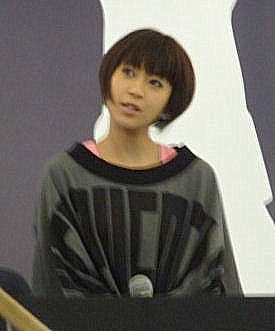
Japanese singer Ayumi Hamasaki has released eighteen studio albums, five compilation albums, twenty-six remix albums, four live albums and numerous singles and promotional singles. She debuted in 1995 under Nippon Columbia with the stage name Ayumi, releasing an extended play Nothing from Nothing, which was a collaboration with Dohzi-T and DJ Bass. Three years later, Hamasaki debuted again as a singer under Avex Trax with the single "Poker Face" (1998). Her first album A Song for ×× (1999) debuted at number one on Oricon's albums chart, and sold over 1.4 million copies.

The discography of Japanese-American R&B and pop singer Hikaru Utada consists of eleven studio albums, four compilation albums, eleven video albums and numerous singles and promotional singles. Utada began as a musician in the early 1990s as a member of U3, a family unit made up of her, her mother Junko Utada, also known as 1970s enka singer Keiko Fuji, and her father, musical producer Teruzane Utada. U3 released their debut album Star in 1993, with the hope to debut in America. In 1996, the group was rebranded as Cubic U, an R&B project focusing on Hikaru Utada, resulting in the English language album Precious in 1998 with record label Toshiba EMI.

The solo discography of Ringo Sheena features eight studio albums, five compilation albums, two extended plays and twenty-seven singles. Signing with Toshiba-EMI in 1998, Sheena released her debut single "Kōfukuron" in May 1998, when she was 19 years old. She subsequently released the singles "Kabukichō no Joō" and "Koko de Kiss Shite", the latter becoming her first hit. As of 2014, Sheena has been signed with EMI Records following EMI Music Japan being absorbed into Universal Music Japan.

The discography of Japanese R&B singer Misia consists of nine studio albums, three compilation albums, one extended play (EP), one live album, six remix albums, twenty-six singles, twelve promotional singles, eighteen video albums and thirty-seven music videos. In 1997, Misia signed a recording contract with BMG Japan and joined the then up-and-coming talent agency, Rhythmedia. Under the sub-label Arista Japan, Misia released her first single, "Tsutsumikomu Yō ni..." in February 1998, followed by "Hi no Ataru Basho" in May. In June, her debut album, Mother Father Brother Sister, opened at number three on the Oricon chart. The album peaked at number one three weeks later and stayed in the top five for eleven consecutive weeks. Mother Father Brother Sister was certified double million and won a Japan Record Award for Best Album, as well as a Japan Gold Disc Award for Pop Album of the Year. In 2000, Misia's second studio album, Love Is the Message, debuted at number one and was certified double million. It won a Japan Record Award for Best Album and a Japan Gold Disc Award for Pop Album of the Year. The album spawned three top ten hits: "Believe," "Wasurenai Hibi" and "Sweetness." Misia's first remix album, Misia Remix 2000 Little Tokyo, was released three months later and shot to number one. It sold over 800,000 copies and is the second best-selling remix album of all time in Japan.

BUT / Aishou(愛証 / Love Proof) is singer-songwriter Koda Kumi's 35th single and was released on March 14, 2007. It was her first single of 2007 and first to bring her new era, Kingdom. The single was a limited purchase, only being sold from March 2007 to May 2007. It charted No. 2 on Oricon and stayed on the charts for fourteen weeks. The single was released the same day as her third compilation album, Best ~Bounce & Lovers~, which was also of limited release.

The discography of Mika Nakashima includes 11 studio albums, 7 compilation albums, 45 singles and 20 video albums. These have all been released through Sony Music Entertainment Japan.

Alone is the ninth single by B'z, released on October 10, 1991. This song is one of B'z many number-one singles in Oricon chart. The single was re-released in 2003, and re-entered at #8. It sold over 1,127,000 copies according to Oricon. It was used as the drama Hotel Woman's theme song. The song was the 10th best selling single of 1991 and the 56th best selling single of 1992, making their only single to chart for two years in the yearly charts.
The discography of Japanese singer Mai Kuraki consists of fifteen studio albums, six compilation albums, twenty-three video albums, three remix albums, fifty-six singles, and sixteen promotional singles. Kuraki debuted in 1999, while she was still in high school, through Giza Studio. The label initially marketed Kuraki in the United States under the name Mai K, and released the single "Baby I Like" (1999). However, the single was a commercial failure which prompted the label to send her back to Japan. There, they released her single "Love, Day After Tomorrow", which peaked at number two on the Oricon Singles Chart and was certified million by the Recording Industry Association of Japan (RIAJ). The second single, "Stay by My Side" became her first number one single on the chart. Kuraki's debut album, Delicious Way, topped the Oricon Albums Chart and was certified triple million by the RIAJ.
"Triangler (トライアングラー)" is Maaya Sakamoto's sixteenth single. The title track was used as the opening theme for the mecha anime Macross Frontier and won the 2008 Animation Kobe award for best theme song. The single reached number 3 on Oricon weekly chart and so far is the best selling single of Maaya Sakamoto.

Kana Nishino is a Japanese singer and songwriter signed with SME Records' Newcome Inc. She debuted on February 20, 2008 with the single "I."
"Sakura" is the debut single of Japanese trio Ikimono-gakari, released in Japan on March 15, 2006. The single peaked at number 17 on the weekly Oricon chart, charting for 31 weeks. It also reached number 182 on the yearly chart for 2006. "Sakura" was certified platinum by the Recording Industry Association of Japan.

The discography of Japanese recording artist and actor Masaharu Fukuyama consists of ten studio albums, four compilation albums, three remix albums, twenty video albums, and numerous physical and promotional singles. Fukuyama debuted through BMG Japan by releasing the single "Tsuioku no Ame no Naka" (1990) and the album Dengon. The works failed to chart, however, in 1992 the single "Good Night", aided by the popularity it gained through use in the drama Ai wa Dō da, charted on the Oricon Singles Chart, peaking at number nine. In 1993, his album Calling became his first number one album on the Oricon Albums Chart; it has sold over 850,000 copies in Japan and has been certified two-times platinum by the Recording Industry Association of Japan (RIAJ).

"Kimi tte" is a song by Japanese pop singer Kana Nishino. It was released as her 12th single on November 3, 2010. The song was marketed as a "heart-warming tender" mid-tempo ballad in the initial press release, also describing the lyrics, as being about "scaling up passion to love."

"Jumping" is a song performed by South Korean girl group Kara from their debut Japanese album, Girl's Talk (2010) and their fourth EP, Jumping (2010). It was released on November 10, 2010, as the second Japanese single.

"Jet Coaster Love" is the third Japanese single of South Korean girl group Kara. The single was originally set to be released on March 23, 2011, but following the 2011 Great Tohoku Earthquake and tsunami disaster in Japan, the physical single was rescheduled to April 6, 2011. In order to help out the areas affected by the disaster, the group had decided to donate all proceeds from the sales of this single, both physical and digital, to relief efforts. It eventually became the group's first single to reach #1 on Oricon Daily and Weekly charts.

"Dear" is the thirty-third single by Japanese singer Mika Nakashima, released on April 27, 2011. It peaked at number 8 in the Oricon Weekly Singles Chart, and sold over 25,000 copies. In May 2011, the song was certified Gold by the RIAJ for digital downloads of over 100,000.
The discography of Japanese musical act Rip Slyme consists of ten studio albums, four compilation albums, two extended plays, one live album, eight video albums and thirty-three singles. Rip Slyme debuted as an independent act on File Records in 1995, releasing material with them until their major label debut under Warner Music Japan in 2000. The band's second album under Warner, Tokyo Classic (2002) was a commercial success, selling over 1,000,000 copies.

The discography of M-Flo features nine studio albums, nine compilation albums, one live album and 25 singles. These were released on Labsoul Records and Avex Group independent label Rhythm Republic in 1998, and from 1999 onwards released through Rhythm Zone.
The discography of Japanese pop duo Dreams Come True consists of 20 studio albums, 6 compilation albums, 17 video albums, and numerous singles. The band was formed in 1988 by Miwa Yoshida, Masato Nakamura, and Takahiro Nishikawa as Cha-Cha & Audrey's Project, which was later changed to Dreams Come True. The first single "Anata ni Aitakute" did not chart, but their eponymous debut album sold over a million copies in Japan and was certified Million by the Recording Industry Association of Japan (RIAJ). The follow-up albums also performed well on the charts, with the 1989 release Love Goes On... lingering on the Oricon Albums Chart for four years. The group's fifth studio album The Swinging Star (1992) was at one point, the best-selling album in Japan, shifting over 3.7 million copies in the country.
The discography of Japanese singer-songwriter Kazumasa Oda consists of ten studio albums, four compilation albums, two cover albums, three video albums, and thirty solo singles. Oda began his career as a performer of the folk-rock band Off Course. He began releasing solo material in 1985. His 1991 single "Oh! Yeah!" / "Love Story wa Totsuzen ni" topped the Oricon Singles Chart and was certified two-times million by the Recording Industry Association of Japan (RIAJ). When his 2016 compilation album Ano Hi Ano Toki topped the Oricon Albums Chart, Oda became the oldest artist in the country to achieve the accomplishment.














